Iraqi Parliamentary Speaker In Tehran To Call For Regional Talks
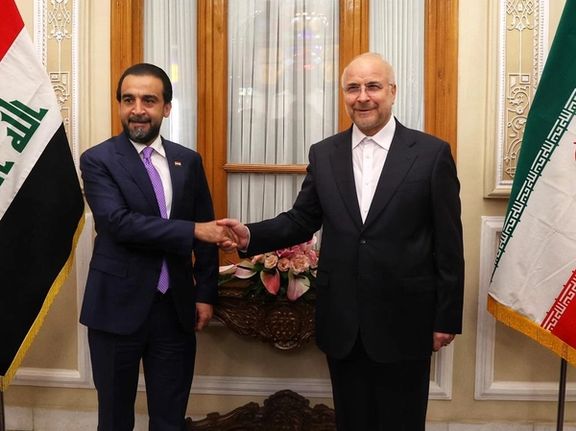
Visiting Tehran, Iraq's parliament speaker has stressed Baghdad’s commitment to helping ease regional tensions through diplomacy.

Visiting Tehran, Iraq's parliament speaker has stressed Baghdad’s commitment to helping ease regional tensions through diplomacy.
Mohammed al-Halbousi, who arrived in Tehran at the head of a parliamentary delegation Wednesday, said the country’s Prime Minister Mustafa Al-Kadhimi had attended the latest round of talks between Tehran and Riyadh, which was held in the in Baghdad last week. Al-Halbousi made the remarks in a joint press conference after meeting with his Iranian counterpart Mohammad-Bagher Ghalibaf.
“We see negotiation and understanding as the solution to problems between neighbors,” al-Halbousi said. “Many problems require dialogue and consultation”. Diplomatic relations between Sunni Muslim-ruled Saudi Arabia and predominantly Shiite Iran were broken off in 2016, with the two supporting opposing sides in conflicts in both Syria and Yemen.
During his one-day visit, al-Halbousi was also scheduled to meet with President Ebrahim Raisi, Secretary of the Supreme National Security Council Ali Shamkhani, and Foreign Minister Hossein Amir-Abdollahian.
Halbousi's visit to Iran − his second since 2018 when he assumed office − took place as factional discussions continue over forming a new Iraqi government several months after parliamentary elections. Halbousi’s Sunni alliance is part of a parliamentary bloc in which it is allied with Muqtada Sadr’s Shiite party and the Kurdistan Democratic Party, but the process of forming a government is hindered by the complexities of sectarian arrangements and opposition from the Patriotic Union of Kurdistan and Shia parties close to Tehran.
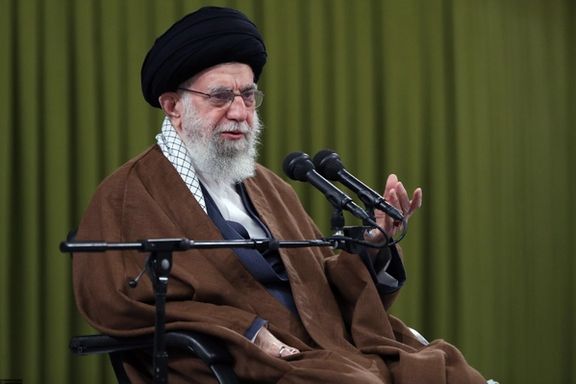
Iran’s Supreme Leader Ali Khamenei says the United States is losing its power and getting weaker and weaker as a new world order is being shaped.
In a meeting with a group of university students and representatives of student associations in Tehran on Tuesday, Khamenei said the world is on the threshold of a new global order that will replace the “monopolar and bipolar world”.
“Today, the world is on the eve of a new international order that has been in the making following the era of a global bipolar order and the theory of a unipolar world order, during which America has been becoming weaker day by day,” Khamenei said.
He added that “The events of the recent war in Ukraine must be viewed more deeply and in the context of the formation of a new world order which will probably be followed by complex and difficult processes”.
In such a new and complex situation, all countries, including the Islamic Republic, have a duty to be active in both soft and hard power to ensure their interests and security and avoid isolation, Khamenei noted.
During his speech, he didn't refer to the negotiations to restore the 2015 nuclear accord, but some in Tehran speculate that the Russian invasion of Ukraine will eventually force Washington to agree to Tehran's demands and make a deal.
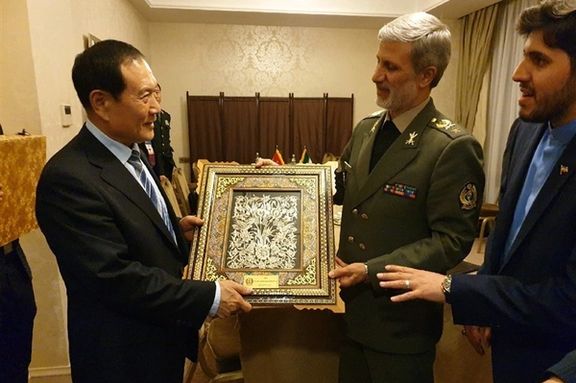
Chinese defense minister General Wei Fenghe is set to visit Iran on Wednesday to meet with senior Iranian officials, including his counterpart Mohammad Reza Gharaei Ashtiani.
In a sign of developing military cooperation, Iran, Russia, and China held naval drills in January in the north Indian Ocean. These were the third such trilateral naval exercises since the first was held in late 2019 and announced as the formation of Marine Security Belt. The 2022 Marine Security Belt exercise covered 17,000 square kilometers and included the navies both of Iran’s Army and its Revolutionary Guards Corps (IRGC).
China’s military role in the region is less than its expanding commercial presence. Chinese trade with Saudi Arabia in 2020 topped $65 billion, and with the United Arab Emirates was around $60 billion.
While Iran-China trade fell back to around $15 billion in 2021 after reaching around $50 billion in 2014, the head of the Tehran-Beijing chamber of commerce, Majid-Reza Hariri, has suggested that the lifting of United States’ sanctions could see it reach $60 billion. Hariri said establishing Iranian representative offices in China was a work in progress.
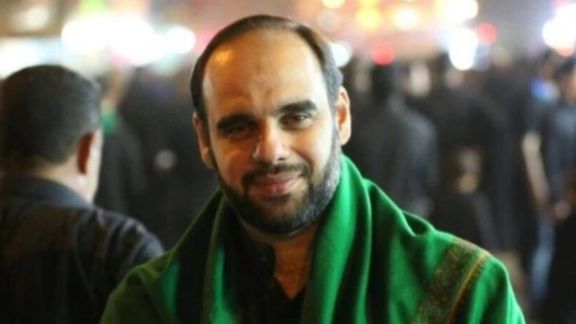
A nephew of the late Mahmoud Hashemi-Shahroudi, Iran’s chief justice from 1999 to 2009, has been sentenced to ten years’ prison for fraud.
Zabihollah Khodaeian, the judiciary spokesman, told reporters Tuesday that Ahmad Hashemi-Shahroudi was also liable for "returning the funds" in the case involving Sarmayeh Bank. But some media have claimed Hashemi-Shahroudi fled to Iraq when a business partner, Mohammad Emami, was arrested in 2016. Emami has been sentenced to a 20-year prison term, according to Khodaeian.
Another defendant in the case, Shahabeddin Ghandali, former chief executive officer of the Iran Teachers’ Reserve Fund, was arrested in 2016 on charges of embezzling $2.5 billion. The fund, which has 800,000 members and is run by the education ministry, was an investor in Sarmayeh Bank.
According to a confidential report of the Iranian parliament leaked by reformist lawmaker Mahmoud Sadeghi in December 2020, Hashemi-Shahroudi and Emami took loans from Sarmayeh between 2012 and 2014 to invest in property. They subsequently sold the properties to Sarmayeh at far higher prices, with the bank − according to the report − waiving penalties for late repayment.
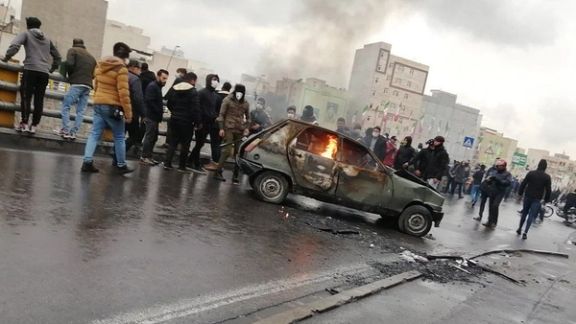
The fund lost nearly $3.5 billion of its investments in Sarmayeh Bank as a result of fraud perpetrated by, according to judicial officials, over 400 individuals.
Parviz Kazemi, minister of labor and social welfare under President Mahmoud Ahmadinejad's cabinet, Ammar Salehi, son of army commander Ataollah Salehi, and Hadi Razavi, son-in-law of Mohammad Shariatmadari, minister of labor in Hassan Rouhani's cabinet, were among defendants in the case.
Corruption and cronyism, often associated with political figures and groups, has plagued Iran for over a decade. There have been several massive fraud and embezzlement cases since then, including in major banks and other financial institutions.
In 2017 and 2018 corruption in the financial sector and rising prices sparked the biggest wave of anti-government protests since the unrest over a disputed election in 2009.
In October 2020, Spain extradited Sarmayeh’s former chief executive officer (CEO), Alireza Heydar-Abadipour, who had been arrested in 2019 following a "red notice" to Interpol issued by Iranian police. Heydar-Abadipour had been sentenced in absentia to a 12-year prison sentence for fraud and embezzlement.
Lacking an extradition agreement with Canada, Iran was unable to pursue Mahmoud-Reza Khavari, the former CEO of the state-owned Melli Bank, who fled to Canada in 2010, after being accused of embezzling billions of dollars.
In 2017 and 2018, protesters who lost their deposits in the Samen al-Hojaj Finance and Credit Institution in Khorasan province held rallies in front of banks and other financial institutions. Samen al-Hojaj, which went into liquidation, had lent tens of millions of dollars at a very low interest rate and paid high salaries to some officials, while not paying dividends to small investors lured with promises of high returns.
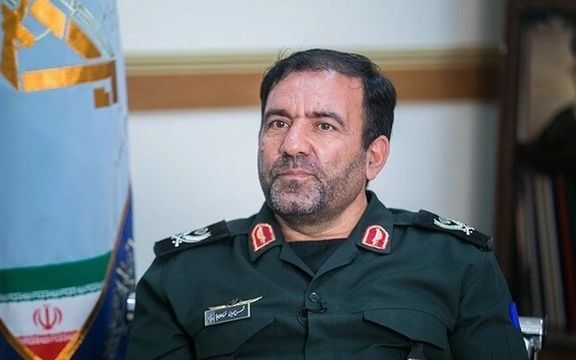
A general of Iran’s Revolutionary Guard (IRGC) has been appointed the new CEO of the country’s flag carrier Iran Air.
Second Brigadier General Shamseddin Farzadipour was assigned to the job on Monday upon a decree by Transportation Minister Rostam Ghasemi (Qasemi), himself a brigadier general who served as a commander in the overseas branch of the of the IRGC, the Qods (Quds) Force.
Farzadipour was serviong a commander of aviation operations at the IRGC’s Air and Space Force.
Since President Ebrahim Raisi (Raeesi) took office, more and more Revolutionary Guard commanders have been appointed to civilian positions, such as governors, ministers and top managers and advisors.
Iran Air -- locally known as Homa -- has been struggling with a series of financial crisesin recent years as the company has been unable to implement fleet modernization plans due to US sanctions.
The company had ordered 200 passenger aircraft -- 100 from Airbus, 80 from Boeing and 20 from Franco-Italian turboprop maker ATR – following the nuclear agreement in 2015 that were supposed to ease restrictions but when former president Donald Trump left the deal, Washington revoked licenses for Boeing Co and France’s Airbus to sell Homa commercial planes.
In March, a group of retirees and employees of Homa held a protest rally over their living conditions as the company faces huge amounts of unpaid pensions as well as several debts to the government and private companies.

A health ministry official in Iran has criticized the development of too many homegrown Covid vaccine varieties, with most unused and expiring in storage.
Speaking at a pharmaceutical seminar Monday, Dr Ramin Sarami, chairman of the health ministry's new medical technologies, said the number of programs to develop seven variants exceeded the total of all approved vaccines in the world. "These [projects] could have been limited to two vaccine development centers," he said.
Iran approved development of seven different vaccines – including CovIran Barekat (Barakat), Pasto-Covac, Sinagen, Razi Cov Pars, Fakhra, Noora, and SpikoGen -- when there were less than ten other major vaccine development projects underway worldwide and even fewer that received international approval. None of the Iranian varieties received international approval. Even neighboring Iraq does not admit travelers vaccinated by Iranian variants. 18 million doses are stored and are about to expire.
CovIran Barakat, the most widely promoted homegrown vaccine, was developed by Barakat Foundation, a charitable entity and business group controlled by Supreme Leader Ali Khamenei’s office, while the program for development of Noora and Fakhra were launched by the Revolutionary Guards and the ministry of defense. These entities had no prior record and experience in the field or the required infrastructures.
The expiration of stored homegrown vaccines is a symbolic representation of uncalculated decision-making and policies in the country, a commentary by political activist Ehsan Bodaghi in reformist Shargh newspaper said Tuesday. "There isn't even domestic demand for the vaccines that were supposed to have long queues of foreign buyers and become our pride," Bodaghi wrote.
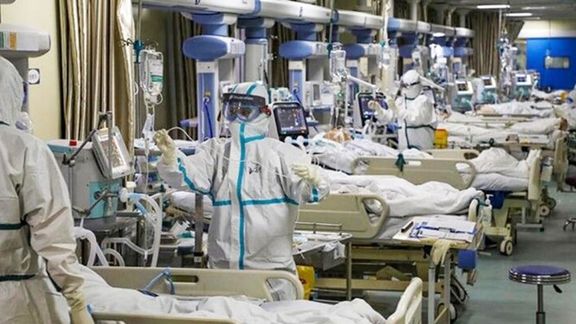
Bodaghi said the authorities' uncalculated vaccine policies caused thousands of hours of work, months of delay in mass vaccination, and huge sums of government resources but more importantly, he argued, the loss of "public trust".
In January 2021, when the US-German Pfizer and Moderna and the British-made AstraZeneca were the only shots available, Supreme Leader Ali Khamenei banned importing US and British-made vaccines, arguing that the US and Britain could not be trusted. Khamenei told Iranians that he would personally wait until homegrown vaccines became available. He was reported to have received the CovIran Barekat vaccine in June.
Until June 2021, Iran's national vaccination plan had not made any significant progress, with only 1.2 percent of the 84 million population having been fully inoculated. Many countries in the region were well into mass vaccination at the time.
Hardliners, who in general extol self-sufficiency, claimed imported vaccines could be used as a biological weapon against Iranians and a high-ranking Revolutionary Guard official said foreign vaccines were meant to kill one-fifth of the world population.
Most Iranians did not trust the homegrown vaccines and waited until other vaccines, mainly Chinese and some AstraZeneca produced in countries other than Britain, were imported.
Imports did not speed up until August, when hardliner President Ebrahim Raisi took office and somehow China began delivering tens of millions of doses. By then, a severe wave of infections had already killed an additional 40,000 people from June to the end of August.
The controversy over Barekat’s vaccine development went beyond the alleged pre-payment of $1 billion to the company from government coffers. Officials of the foundation including Mohammad Mokhber, now President Ebrahim Raisi's vice-president, had repeatedly promised to deliver tens of millions of doses by the end of August. By September 2021, the company had only produced 14 million doses, according to one of its officials, and delivered only six million to the health ministry.